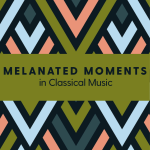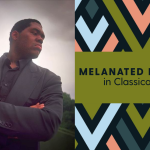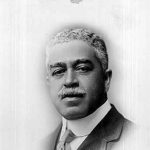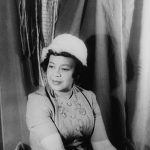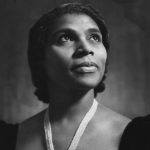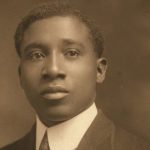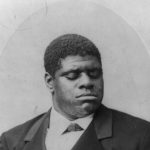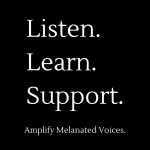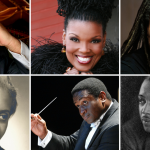Melanated Moments, S1E1: The Dean – William Grant Still
On our debut episode of Melanated Moments in Classical Music, Joshua introduces us to one of his favorite composers, William Grant Still. Known as the Dean of African American Composers, his Africa Suite transports the listener to the dawn of time and the cradle of civilization. Joshua and Angela discuss the piece’s second movement, Land of Romance, as well as cartoons, relationships, and defying stereotypes.
Featured Music:
“Africa II: Land of Romance,” by William Grant Still
MMCM Theme (00:15): [inaudible] Joshua Thompson (00:15): Welcome to Melanated Moments in Classical Music. I’m your co-host Joshua Thompson. Angela Brown (00:19): I’m Angela Brown. And we’re here to introduce and reintroduce you to melanated masterpieces written and performed by for and about Black people. Joshua Thompson (00:31): That is correct from light bright to midnight. There’s a whole lot of people– Angela Brown (00:36): Did you go there? Joshua Thompson (00:36): I did, and we gon’ stay there, but there’s a whole lot of people, uh, pieces, performances that we would like to cover. But we are here to talk about and take you inside the classical music that most folks don’t know a whole lot about, or they don’t hear a whole lot about. So, you know, that’s what we do. Angela Brown (00:54): Indeed we do. Who, and what do you have for us today, Maestro Joshua? Joshua Thompson (00:58): Well, I got a special treat for you all from one of my all time favorite composers. And I would say out of the Black composers who tends to get acknowledgement and recognition, this man seems to come at the, at the top of the list. Angela Brown (01:15): Well who is it? Joshua Thompson (01:15): William Grant Still. Angela Brown (01:16): Yes. Joshua Thompson (01:17): Okay. So you’ve heard of him? Angela Brown (01:18): Oh yes, baby. Joshua Thompson (01:19): Often known as the Dean of classical music for Black folk. I just think he’s a Dean of classical music period. The brother was bad, was bad. He’s got well over 150 compositions to his credit. So he was writing for solo piano. He was writing for voice, for opera, for small ensembles for full orchestras, you name it– Angela Brown (01:43): Song cycles, I’ve sung some songs cycles of his. And like you mentioned, the opera Troubled Island. Joshua Thompson (01:48): Yes. So the piece I wanted to highlight of William Grant Still, even though it’s not going to be Troubled Island, another one that’s even lesser known, I think, but no less impactful is his Africa Suite for solo piano. Angela Brown (02:01): Oh. So you’re going to cover an entire continent today. Joshua Thompson (02:04): Well, I’m gonna try. Okay. We’re gonna break it down. We’ll break it down. So I wanted to highlight the second movement. So there’s three movements to the entire work, but we’re going to talk about the second movement. It’s called Land of Romance. Angela Brown (02:17): I do love me some romance. Right. Joshua Thompson (02:22): And who doesn’t? Who doesn’t? So I don’t know. Let me, let me ask you this. What is the first thing you think of, or what do you think of when you hear the word Romance? Angela Brown (02:31): I think of a roaring fire, of soft, beautiful things wrapped around my body. Anything soft and beautiful and lush. Joshua Thompson (02:43): So you come with all the feels, the tactile of romance, right? I think if you would ask a lot of people, they think of romance as in boy meets girl, girl meets boy or any other combination. Angela Brown (02:54): Yeah. Joshua Thompson (02:54): So relationships, it’s kind of what you think of, but I’m going to change it up just a little bit. And we’re going to think about the word romance using this movement to think about our relationship between nature and with our creator. Angela Brown (03:12): Oh. Okay. So you pulled me all the way back from my little– Joshua Thompson (03:15): Wait a minute though– Angela Brown (03:17): Consensual stuff. Joshua Thompson (03:18): Your eyebrows were kind of furrowing and I was like, “Oh, I’ve lost her,” but hey, I promise I’m gonna bring you and everyone else back. Angela Brown (03:24): Okay, come on. Joshua Thompson (03:25): So first things, first little bit of background on William Grant Still, lots to cover. We just go and hit the highlights born in 1895 died in 1978 and he was from Mississippi. And he’s the first African-American composer to have a major work premiered by a major symphony. So lots of firsts for him, but William Grant Still was a very religious, spiritual, philosophical person. And that is really reflected in almost all of his compositions. He’s going to make your brain think about it just a little bit. So Land of Romance for him was really talking about the idea of how we got here as a people, as a human race, how we wound up on the planet and our relationship as we have evolved as the species with our creator and with nature. Am I getting too deep for you? Angela Brown (04:17): Chile, we in the ocean. Joshua Thompson (04:19): Okay, well, you know, well I brought my waders and I brought you some boots– Angela Brown (04:23): Thank you, we gon’ wade on through them boots. Joshua Thompson (04:26): Really love this piece. The second movement, this Land of Romance for me, gives a honest and dignified depiction of the totality of Blackness. So this piece is sort of broken up into three separate parts, within one movement. And in the beginning… Music Plays (04:43): [William Grant Still, “Land of Romance”] Joshua Thompson (04:52): The beginning starts with this very dream-like, almost sunrise type sentiment to it. It’s like the Dawn of time. Music Plays (05:03): [William Grant Still, “Land of Romance,” continued] Joshua Thompson (05:08): So here we are in the cradle of civilization, which is the Africa and it’s very light and ambient and mysterious, it was very beautiful too. Angela Brown (05:30): Oh. Music Plays (05:19): [William Grant Still, “Land of Romance,” continued] Joshua Thompson (05:30): And then we get a little bit deeper. Angela Brown (05:32): There’s more. Joshua Thompson (05:33): Then we get into a little bit more of that sensual coquettish– Angela Brown (05:41): Oh! Joshua Thompson (05:41): Flirtiness with our existence, a little bit [laughter]. Music Plays (05:49) [William Grant Still, “Land of Romance,” continued] Joshua Thompson (05:56): So yeah, he’s being very flirty here, and he does it brilliantly in an almost jazzy and bluesy way, but it’s also still iconically classical. Music Plays (06:06): [William Grant Still, “Land of Romance,” continued] Joshua Thompson (06:17): So where’s the pieces developing, we are developing okay. Angela Brown (06:21): Okay. Joshua Thompson (06:21): As people, as a people, as Black people, but also as, as a species developing into our own, coming up with our own language, our own movement, our own sensibilities and sexualities. And then it finishes itself off with this very, nice stately and bombastic and dignified statement of Africa and the people who were in it. And this idea of creation. Music Plays (06:42): [William Grant Still, “Land of Romance,” continued] Joshua Thompson (07:02): And at this point, I just like to close my eyes and let myself sink into the music. Music Plays (07:15): [William Grant Still, “Land of Romance,” continued] Joshua Thompson (08:44): So by this point, we’ve gone from the Dawn of time to establishing a whole culture and civilization. And he does all of this in eight minutes. Angela Brown (08:53): Wow. Joshua Thompson (08:54): A whole continent, a whole civilization. Angela Brown (08:56): In eight minutes. Joshua Thompson (08:58): Eight minutes. Angela Brown (08:59): Okay! Joshua Thompson (08:59): I told you the brothers bad, the brothers bad. And we don’t hear this piece all that often. I think for me, it’s a big problem for me. I really get upset when pieces like this don’t get played a whole lot. Angela Brown (09:10): Well, that’s why we’re here– Joshua Thompson (09:12): It is. Angela Brown (09:12): To get people to discover and rediscover pieces that they didn’t know existed. Joshua Thompson (09:21): One of my favorite parts about the whole work in general, about the second movement, is it offers a very sincere and authentic musical representation of the Black aesthetic. Right? A lot of times I think we’re used to, if everything isn’t draped in kente cloth and with drums, it’s not authentically Black, but don’t get me wrong. There’s a place for that. It’s part of our culture. Angela Brown (09:42): Yes, I like wearing my Mud cloth. Joshua Thompson (09:44): I know, as you have it on now. Angela Brown (09:45): That’s right. Joshua Thompson (09:45): However, we’re broader than that. Angela Brown (09:48): Yeah. Joshua Thompson (09:48): We’re more comprehensive. There’s a lot more intricate that’s going on there. So those highs and lows and that natural way that he mixes classical music and romanticism with jazz and blues, because that’s the era he’s writing in, seamlessly fits together to kind of create this amazing musical tapestry that our people and other people in general can tap into, identify, and be proud of Angela Brown (10:13): He’s a product of his environment. Yes. Joshua Thompson (10:16): So those are some things that I feel so saying what some of those things too, I think this was a good piece to help us shed some stereotypes of Black people and Blackness and the continent of Africa. I don’t know. I was a big cartoon watcher growing up, were you? Angela Brown (10:29): Oh yes, definitely. Joshua Thompson (10:30): What were your cartoons? Angela Brown (10:31): Tom and Jerry. And oh… That, uh, hen that would go around– Joshua Thompson (10:37): Foghorn Leghorn. Angela Brown (10:38): Foghorn Leghorn! Joshua Thompson (10:38): “I say, I say, I say!” [Laughter] So I can distinctly remember there is a cartoon, it’s from the forties or fifties, and it’s got Bugs Bunny in it and he’s flying over the continent of Africa. And as he is over West Africa, it says “Dark Africa,” that’s a little dark. And then as he flies towards central Africa, it says “Darker Africa” and is darker. And then as he’s getting East and South Africa, it says “Darkest Africa” and it’s pitch black. Right. And so as a kid, you’re thinking no big deal, but as adults, we all know what that means. Right? Angela Brown (11:13): It’s funny you would even mention that because it brings up, this is totally off of William Grant Still– Joshua Thompson (11:19): That’s alright. Angela Brown (11:19): Because I don’t know why we’re going towards, with the cartoon. But imma go with you, you stay with the cartoons, boo boo… But I got to tell this story, one time I was doing this Aida and there was something that I wanted to do that was very African. And this director, he was like, “Well, no. She wouldn’t do that because it’s not that dark. The Egyptians, aren’t part of the real part of Africa or the darkest part of Africa” or something like that. And that was like isn’t Africa, Africa. I’m sorry. Joshua Thompson (11:50): Wow. So how did you fix your face to stay professional, keep it moving? Angela Brown (11:52): Let me look over at the camera, but I’m gonna look at you right now. And that was like, “I’m sorry, honey. Africa is Africa. Now you, yeah, you have different cultures and things going within Africa, but the continent of Africa– Joshua Thompson (12:05): Is what it is. Angela Brown (12:05): Is what it is. Joshua Thompson (12:07): Thank you. Angela Brown (12:07): If you from there, you African, okay, or Afrikaans. Joshua Thompson (12:10): Your story does relate to my cartoon, into my whole thing is these are these stereotypes that are out there that remain out there in literature and cartoons, and also in the music or the misinterpretation of, we’re not heathens. We’re not savages. So this piece gives an opportunity to elevate, not just the music, but also a people and show us in a very comprehensive, respectful, dignified manner. That’s what I think. Angela Brown (12:37): Okay. Joshua Thompson (12:37): And that’s why the song and the selection went on the show today. Angela Brown (12:40): All right now. Joshua Thompson (12:41): So there are three movements to it. I’m sure there’ll be many, many more from William Grant Still that we can, and that we probably will highlight as we continue with this incredible show to highlight Black folks and everything. So with that being said, you have heard the second movement of the Africa Suite, Land of Romance, written by William Grant Still. I’m Joshua Thompson. Angela Brown (13:04): Angela Brown. Unison (13:05): And this has been your Melanated Moment in Classical Music. Joshua Thompson (13:14): Melanated Moments in Classical Music is a production of Classical Music Indy. Angela Brown (13:19): Our Producer is Ezra Bakker Trupiano. Our production intern is Auboni Hart. Our theme music was composed by Laura Karpman. Melanated Moments in Classical Music is proud to partner with CAAPA, the Coalition for African-Americans in the Performing Arts; supporting black classical musicians, opera singers, youth and others in the performing arts by bringing color to the classics. Learn more at four –that’s, the number 4caapa.org. Classical Music Indy- The Streaming and Podcasting is made possible by the Allen Whitehill Clowes Charitable foundation. Melanated Moments in Classical Music is proud to partner with Morning Brown Incorporated; working to bridge the gap between accessible, live music programs and underserved individuals, schools, and communities where the offering of classical music is rare or the cost of experiencing classical music is prohibitive. Learn more at morningbrown.org. MMCM Theme (14:35): [inaudible].
[/su_tab] [su_tab title=”Related Blog Posts” disabled=”no” anchor=”” url=”” target=”blank” class=””]LOCAL CLASSICAL – MELANATED MOMENTS SEASON SIX
As we continue celebrating Black Music Month, this week’s playlist will feature music and artists discussed during the latest season of Melanated Moments in Classical Music. All of season six was recently released and featured vibrant discussions about artists such as Scott Joplin, Hazel Scott, Joseph Bologne, and Kenneth Overton, among others.
LOCAL CLASSICAL – BLACK MUSIC MONTH
In this week’s playlist, we celebrate Black Music Month which takes place in June. It was created by President Jimmy Carter in 1979 to honor and celebrate Black artists’ contributions to music. We’ll be honoring the late Herman Whitfield III, an Indianapolis native who was a gifted pianist and composer. We’ll also hear performances of artists who have been featured in season four of Classical Music Indy’s podcast, Melanated Moments in Classical Music.
LOCAL CLASSICAL – MELANATED MOMENTS
In this week’s Black History Month playlist, we bring you recordings by composers, performers, and artists who have been highlighted in our podcast, Melanated Moments in Classical Music. Melanated Moments is the ward-winning podcast from Classical Music Indy that shines a spotlight on musical works composed by, for, and about Black people.
LOCAL CLASSICAL – HOST OKARA IMANI
Hey, Starshine! This is Okara Imani, Media Production Fellow for Classical Music Indy, and your guide to The “I” in Classical Music. I’m here to highlight the cultural and social intersections of the classical art form, beyond the Classical Period and beyond the constructs of Euro-centric high society origins.
Ric’key Pageot: Inspiring a Moment to Learn, Acknowledge, and Respect
Ric’key Pageot: Inspiring a Mo …
Ignatius Sancho: Composing the Hypocrisy of Colonialism & Convention
Ignatius Sancho: Composing the …
NEW CLASSICAL – DR. BILL BANFIELD
This week we bring you the music of Dr. Bill Banfield. Dr. Banfield is an award-winning composer whose symphonies, operas, chamber works have been performed and recorded by major symphonies across the country. Few have a wider, performed professional composing output, that has had public concert performances, reviews, radio, recordings of some 12 symphonies, 7 opera, 9 concerti, chamber, jazz, and popular forms. This alone making Dr. Banfield one of the most performed, recorded composers of his generation. In 2010 and 2016, Dr. Banfield served as a Pulitzer Prize judge in American music.
#AmplifyMelanatedVoices
Classical Music Indy stands with our Black community. We are here to listen, learn, and lend our support. We believe that classical music is powerful; that it evokes a range of human emotions and creative expression.
Angela Brown Brings her Unbridled Zeal to a New Podcast.
Angela Brown brings her unbrid …
Unsung Masterpieces Playlist
We put together a playlist of often unsung masterpieces by composers of African descent. Featuring music with a distinctly American sound by composers like William Grant Still and Florence Beatrice Price, and classical era music by French composer Joseph Bologne, Chevalier de Saint-Georges.



